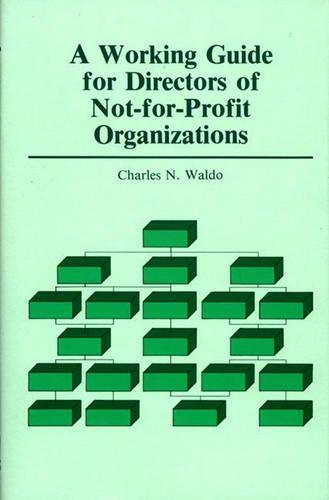
A Working Guide for Directors of Not-for-Profit Organizations
(Hardback)
Publishing Details
A Working Guide for Directors of Not-for-Profit Organizations
By (Author) Charles N. Waldo
Bloomsbury Publishing PLC
Praeger Publishers Inc
24th June 1986
United States
Classifications
Professional and Scholarly
Non Fiction
658.048
Physical Properties
Hardback
148
Description
The author delivers on his goal of providing `a quick, easily read, plain-language overview of basic board mission and action.' The book is chock full of practical nuggets on the board's relation to the chief executive, including three key exhibits: Twenty Tips for Effective Interviews, Twenty-One Good Interview Questions, and Checklist for the Termination Decision Process. There are also informative sections on long-range planning, marketing, commercial ventures, applying for grants, taxes and legal matters, and the use of outside consultants. . . . Waldo stands out among writers on governing boards in stating clearly that unpaid, part-time trustee-directors can't be counted on to provide the matrix of behavioral cues we call organizational leadership. Foundation News Geared toward volunteer directors of not-for-profit organizations, this work offers an easy-to-read, non-technical overview of basic board mission and action. The lay director will discover the primary roles, repsonsibilities, and relationships between himself/herself and the not-for-profit organization he or she serves. The book is divided into the three primary areas of responsibility of a director: fiduciary and legal; monitoring and controlling; and planning and directing. Several chapters are devoted to legal matters and responsibilities, tax considerations, and board structure and committees. Written in a reader friendly style, non-business trained or inexperienced directors will find especially helpful the chapters covering the numbers game. Another chapter discusses the essentials of an effective information package that will help directors monitor and better plan for their organization. The bibliography at the end of the work suggests other books and articles that explore in-depth many of the topics discussed.
Reviews
The author delivers on his goal of providing a quick, easily read, plain-language overview of basic board mission and action.' The book is chock full of practical nuggets on the board's relation to the chief executive, including three key exhibits: Twenty Tips for Effective Interviews, Twenty-One Good Interview Questions, and Checklist for the Termination Decision Process. There are also informative sections on long-range planning, marketing, commercial ventures, applying for grants, taxes and legal matters, and the use of outside consultants. . . . Waldo stands out among writers on governing boards in stating clearly that unpaid, part-time trustee-directors can't be counted on to provide the matrix of behavioral cues we call organizational leadership. That role devolves upon the chief executive. His corollary, that the board's function is more reactive than proactive, ' is certainly true of most well-run' boards but understates the positive influence an outstanding board can have upon an organization. Even so, the role he defines for the board is incontrovertible: hiring the right CEO' and providing sound counsel, strong support and constructive critique.-Foundation News
"The author delivers on his goal of providing a quick, easily read, plain-language overview of basic board mission and action.' The book is chock full of practical nuggets on the board's relation to the chief executive, including three key exhibits: Twenty Tips for Effective Interviews, Twenty-One Good Interview Questions, and Checklist for the Termination Decision Process. There are also informative sections on long-range planning, marketing, commercial ventures, applying for grants, taxes and legal matters, and the use of outside consultants. . . . Waldo stands out among writers on governing boards in stating clearly that unpaid, part-time trustee-directors can't be counted on to provide the matrix of behavioral cues we call organizational leadership. That role devolves upon the chief executive. His corollary, that the board's function is more reactive than proactive, ' is certainly true of most well-run' boards but understates the positive influence an outstanding board can have upon an organization. Even so, the role he defines for the board is incontrovertible: hiring the right CEO' and providing sound counsel, strong support and constructive critique."-Foundation News
Author Bio
CHARLES N. WALDO has served on, studied and observed, and acted as a consultant to many not-for-profit boards for twenty-five years. He is the founder and president of The Delta Consulting Group in Columbus, Indiana, a consulting firm providing organization development and human resource services to both for-profit an NFP organizations. He is the author of Boards of Directors: Their Changing Roles, Structure, and Information Needs (Quorum Books, 1985).
